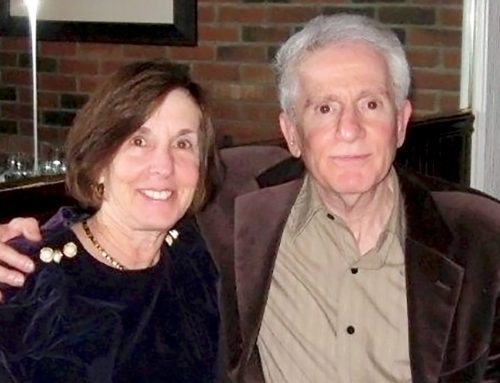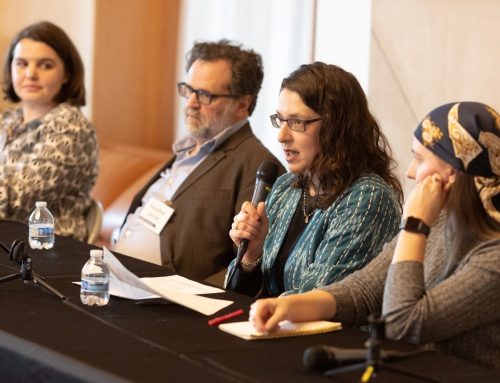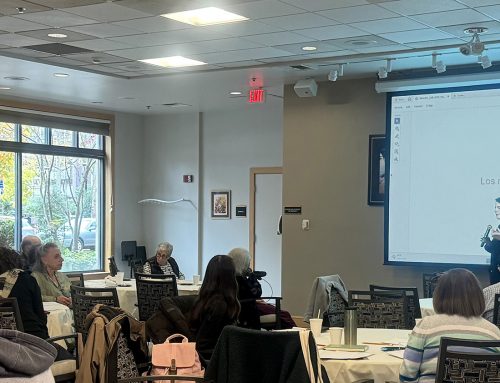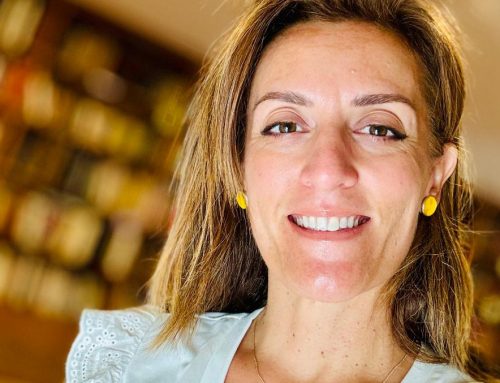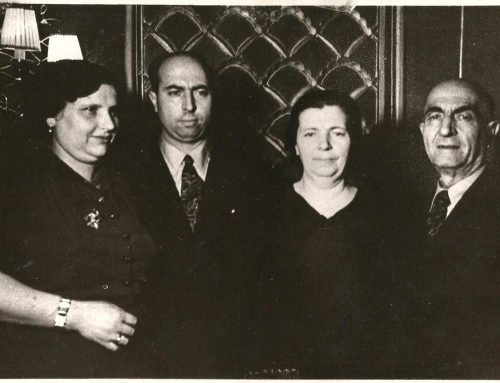Runner up, general category – 2024 “Muestras Konsejas” essay competition. See all winning essays.
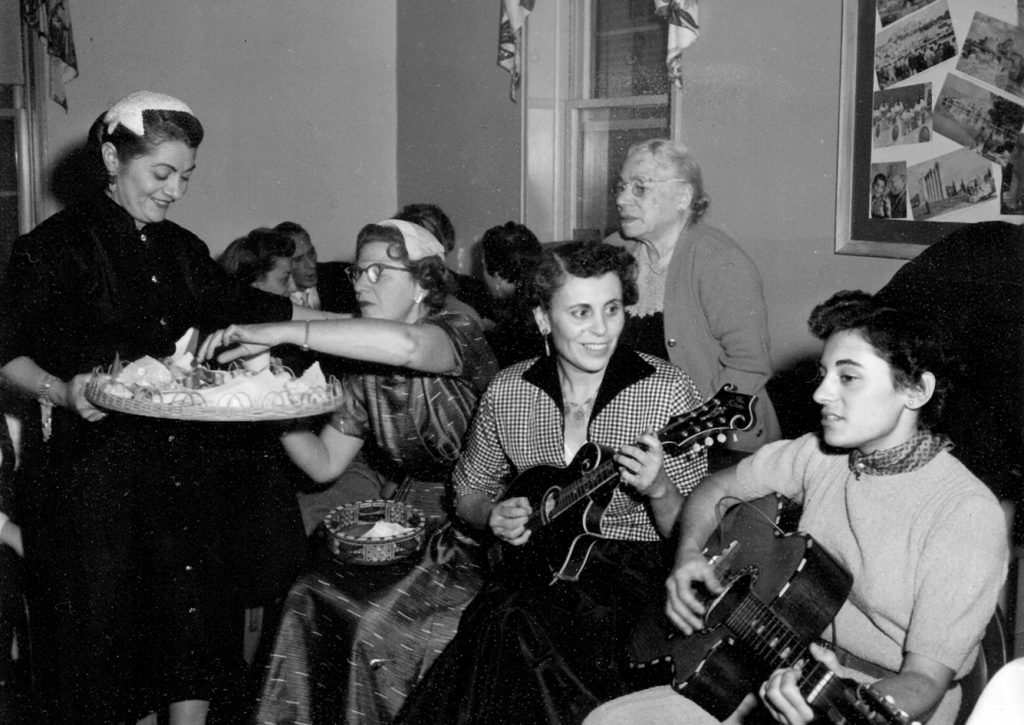
Mother and daughter in harmony
By Gloria DeVidas Kirchheimer
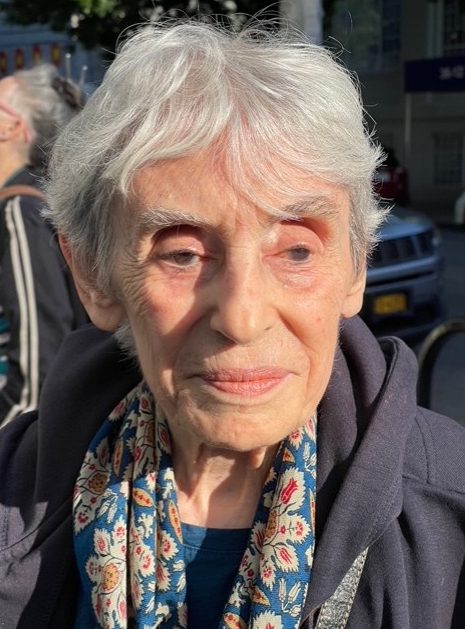
Gloria DeVidas Kirchheimer
There she is in billowing chiffon, leaning against a balustrade on Alexandria’s Upper Corniche, her gauzy scarf blowing in the Mediterranean breeze. You can see the curved bay flanked on either side by King Farouk’s palaces. A movie star smile, the dimples so deep in this sepia photograph from the late 1920s. She’s going dancing again at the Sporting Club with those handsome British soldiers who are carrying out their Mandate in Egypt. She hasn’t yet met my father who is steaming across the Atlantic from New York to meet some distant relatives, including a third or fourth female cousin, who’s almost 22 and still unattached. He will lure her to New York City where he’s been living since his immigration from Turkey in 1919 as a nineteen-year-old. Now he’s a little over 30, an American citizen looking forward to meeting an attractive young cousin whose photo has been sent to him by an uncle thrice removed. It is a tightly knit family.
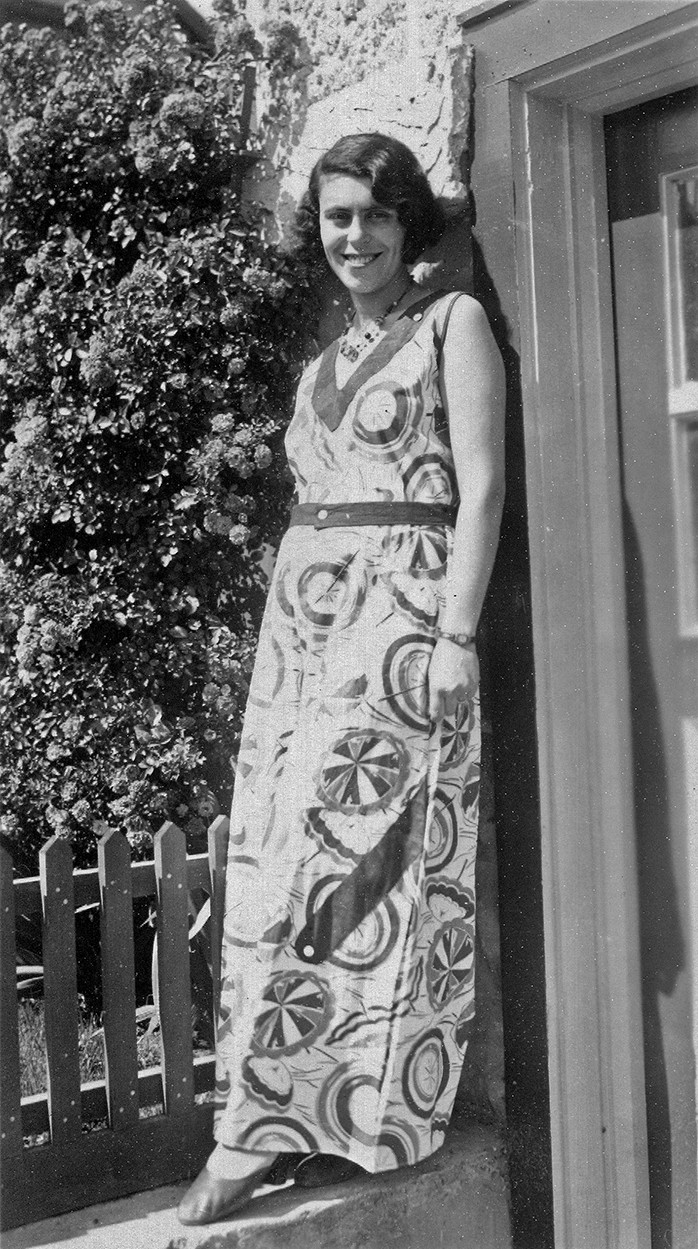
Emilie Levy at leisure in Long Beach, New York
During his visit to Alexandria, my dad charms her with stories about America. They communicate in Ladino and in French though she can match him in English. Her curiosity piqued, she contemplates a short visit. Back home in New York, my dad bombards her with letters and she finally succumbs. Just a visit, then she’ll return home. But my father has marriage in mind and conveys his intentions to my grandfather in Alexandria who concludes that that it might be his daughter’s destiny to marry this well-recommended, gainfully-employed, distant relative. My grandmother must have been heartbroken at the prospect of losing her daughter. Mother is given a leave of absence from teaching at the Lycée and assured that her position will be waiting for her upon her return. In New York she stays with my dad’s family but finds life in New York excruciatingly dull, even though he takes her out every night after a hard day’s work. When she begins making plans to return to Egypt, my father persuades her to go with him to City Hall for a civil ceremony, a mere formality, he says, a legal necessity should she decide to remain in the U.S. as the wife of an American citizen. Since the so-called ceremony is performed by a clerk in a dusty office and not in a synagogue, my mother refuses to believe that they are truly husband and wife. Where is the rabbi, she’d like to know. It is their first quarrel.
She begins to pack for a return trip home. Impossible, my father says. They will have to be divorced first. Next to committing a crime, divorce is considered a sin, as well she knows. My mother is left with no choice. He is the man. He must be obeyed. So says her father in a telegram from Alexandria.
The traditional ceremony does eventually take place and they are married by a Sephardic rabbi from Rhodes though no one from her family is there, nor any of her friends who are all in Egypt. For years my mother claimed that she was tricked into marriage.
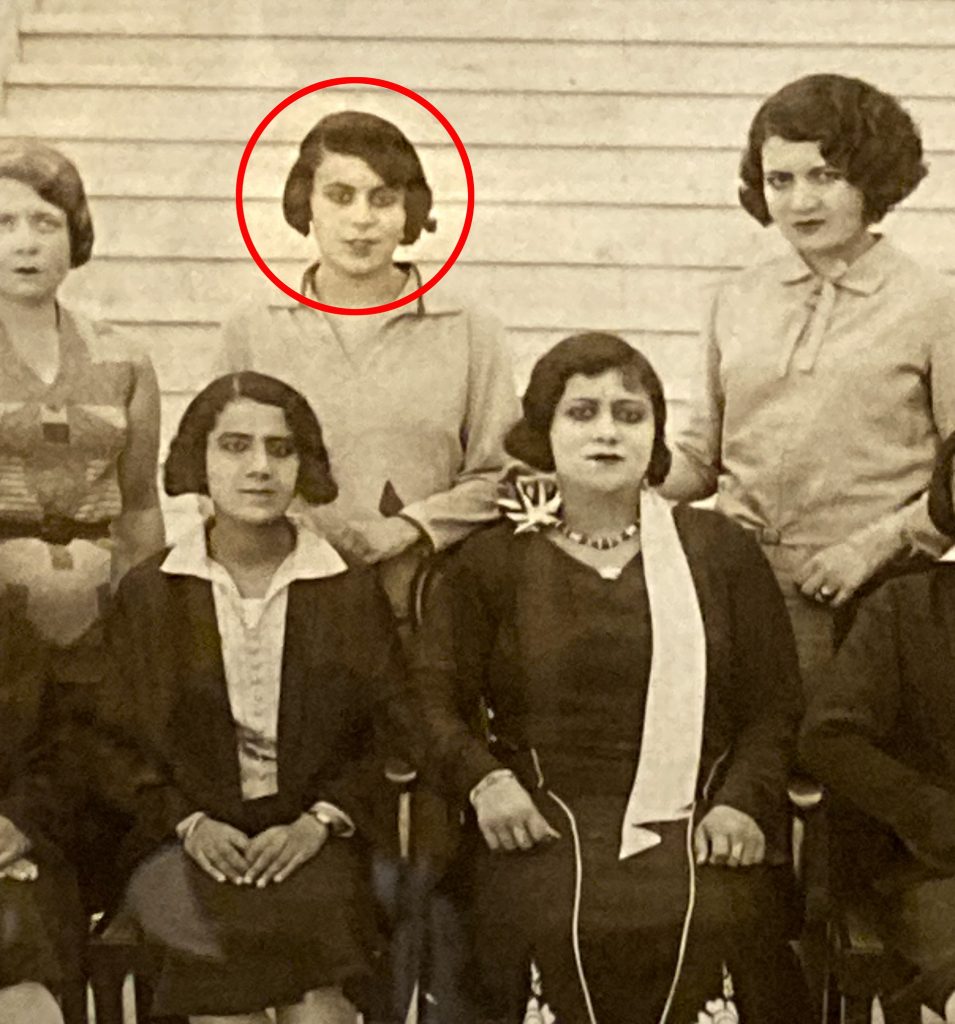
Emilie Levy as a young teacher in Alexandria, Egypt, 1932.
What a life my mother gave up in Egypt, to hear her tell of it. It was paradise, full of outings, parties and total harmony between Jews and Arabs. My grandfather taught her to dance. (More importantly, he taught my grandmother to read and write at a time when most Sephardic women in the early 1900s in Turkey were denied an education.) One time he took my mother to the Claridge Hotel where they saw the Prince of Wales. My mother qualified for the university but only her brothers were allowed to go because she was expected to work to help support the family. I have a picture of her in front of her class at the elite school where she taught French to the daughters of wealthy sheikhs who were driven to school in limousines.
Let’s go back a few centuries. The most stellar ancestor we have is a 16th century mystic, Elijah ben Moshe de Vidas who lived in Safed, Palestine, though his family probably originated in Spain. He wrote a famous treatise on morals for the general public, The Beginning of Knowledge (Reshit Hochma), which correlated Jewish ethical and moral teaching with the Kabala. Like the other Safed mystics of the time, he advocated humility, modesty, asceticism. He cautioned against anger, pride, envy, overeating, excess. By the time it reached my mother the humility gene seems to have dimmed somewhat.
Our famous ancestor was frequently invoked, an imprimatur for Mother’s role as lay religious authority. Her hip surgeon was treated to the entire story of Passover which concluded with the presentation of a jar of the famous Harosset which, as we already know, she had made just prior to her accident on the street, filling as many jars as would fit into her refrigerator, to be distributed among the worthy.
Mother also claimed to be an authority on the correct way to pronounce Hebrew — her way, the Sephardic way. Challenged by my Ashkenazi husband whose pronunciation makes her rock with laughter, she claims our way is the correct one. “How do you know that the Ashkenazi pronunciation isn’t the correct one?” asks her stubborn son-in-law. “There were no Ashkenazim in ancient times,” she counters. “There were no Sephardim either.” Impasse.
She knew the words of innumerable songs from the 1920s, ‘30s, ‘40s, whether they were in French, Ladino, Spanish, Italian, Arabic or English. My mother sang all the time, bursting into song with no provocation, on the street, in a store, a mortification for me whose only wish was to remain inconspicuous. An impossibility with a mother who was born in Egypt. My schoolmates tormented me with questions: Could she do a belly dance? Did she wear a veil over her face?
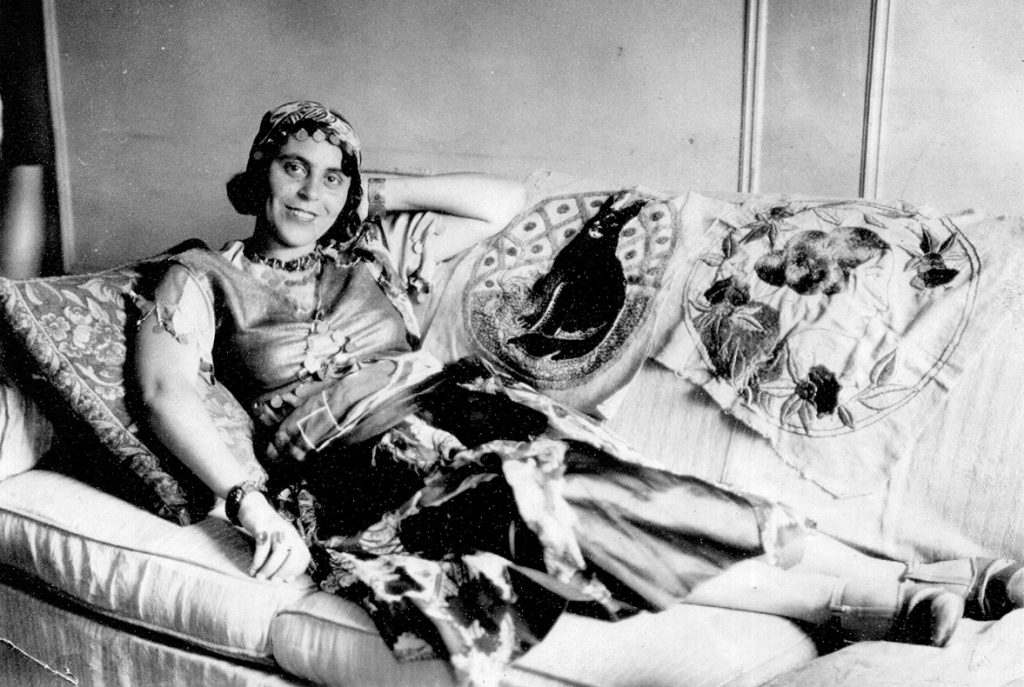
Mother in one of her party outfits
My mother always longed to be on the stage. In the best tradition of George Sand or Jane Austen, she and her friends used to put on amateur theatricals when she was a teenager in Alexandria. Let us not forget that she once saw Sarah Bernhardt perform. Unable to recapture those halcyon days, Mother does the next best thing in the hospital after her surgery. She organizes a French cabaret and demonstrates the art of Sephardic cooking from her wheelchair while undergoing physical therapy. And while we’re in physical therapy, who else would give a history of the Sephardic Jews while doing leg lifts?
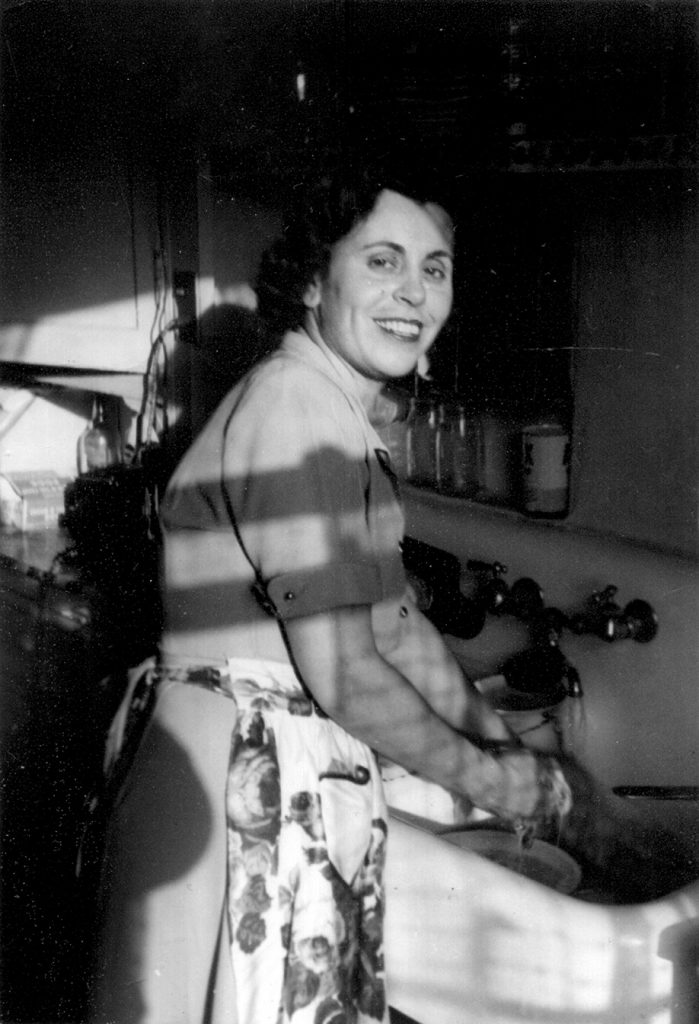
Emilie Levy in her kitchen
She taught me how to cook many of our Sephardic dishes, as well as numerous romansas and proverbs. But I can’t say that she taught me the incantation for the evil eye which she performed when necessary to cure an illness. One cannot learn it in the traditional sense of the word because the spell can’t be taught. And even though there is no formal manual, no class in the technique, generations of women — only women or girls, never men — know it. The closest one comes to actually learning it is through eavesdropping while it is being chanted by a female relative or neighbor behind a closed door. Recited in Ladino and Hebrew, the incantation always results in a cure — whether of a physical ailment or a psychological one like love-sickness or melancholia. I know because my mother recited it over me many times and each time I was cured. I’m sorry but I don’t dare set it down. No snickering please. This is truth.
Trying to duplicate it for friends one day, I found myself yawning violently, a sure sign that the spell was working. I even hung a gaudy charm in the shape of a circular blue eye over my babies’ cribs to ward off the evil eye. My mother didn’t have to persuade me to do it. Where’s the harm? My mother also believed that there were people hiding inside the ATM machines. How else could these devices address me by name in the language of my choice? How indeed? Talk about miracles . . .
When my husband tells me that sometimes I sound just like my mother I don’t know whether to be pleased or annoyed. Shortly before my mother died we took her to one of those mega-stores in a Vermont mall. Since she was too feeble to walk we pushed her around the store in a wheelchair. How dazzling the array of cheap clothing, how friendly the staff, how clean the little snack bar where she had to have the obligatory coffee which, amazingly, she praised. As I pushed her down the aisles she avidly snatched at the passing garments. “Not so fast, not so fast,” she cried. Now, returning to that same K-Mart, I find myself holding back tears. That’s where we sat. Here’s that same saleswoman to whom she related her life story. Between plus sizes and the automotive section she had managed to cram in her origins and a capsule history of the Spanish Inquisition.
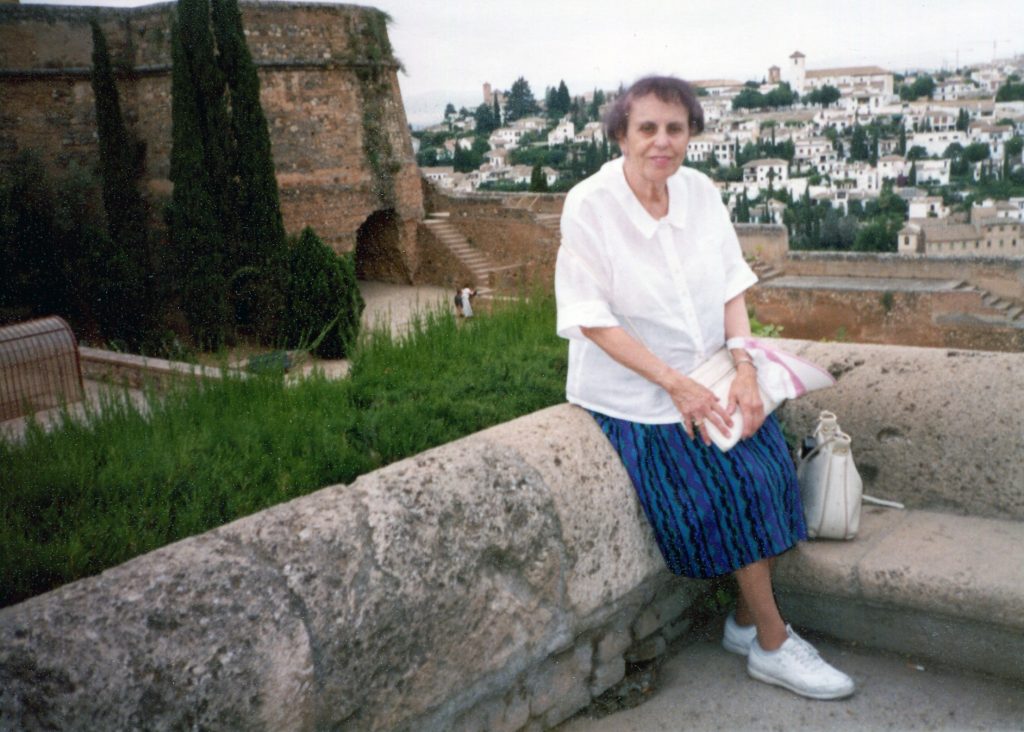
Emilie Levy at the Alhambra in Spain
Is she speaking through me when I greet Latino shopkeepers in Spanish? What I refused to do when she was alive I now do with the greatest pleasure. When I sing a few bars of a song in Ladino or French it disappoints me that whoever is in the room isn’t applauding with delight. But singing makes me happy. Merci maman . . .
There’s a song I used to sing: Sometimes I feel / Like a motherless child / A long way from home . . . A beautiful mournful spiritual. My mother couldn’t bear it. I wonder if she ever felt that she too was a long way from home.
When she was on her deathbed, she cried out in a surprisingly clear voice, “Mama!” She was 92 and calling for her mother. I don’t think I will call for my mother on my deathbed, but you never know.
Presented in partnership with the Sephardic Brotherhood of America, the 2023-2024 “Muestras Konsejas” writing contest opened a new space for the telling of Sephardic stories. Writers were asked to share an original work of prose (fictional or memoiristic) that gives voice to the experiences of the Ladino-speaking Sephardic Jewish communities (whether from family lore, lived experience, community heritage, life stories, etc.). Stories from all over the world were read by an expert panel of judges, who selected four finalists (across both “General” and “Student” submission categories) as the inaugural winners.

